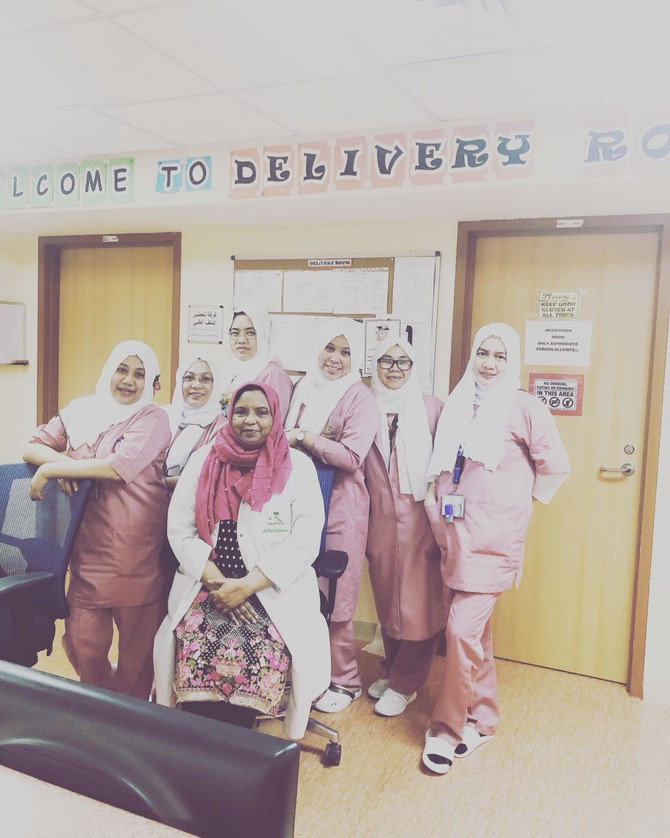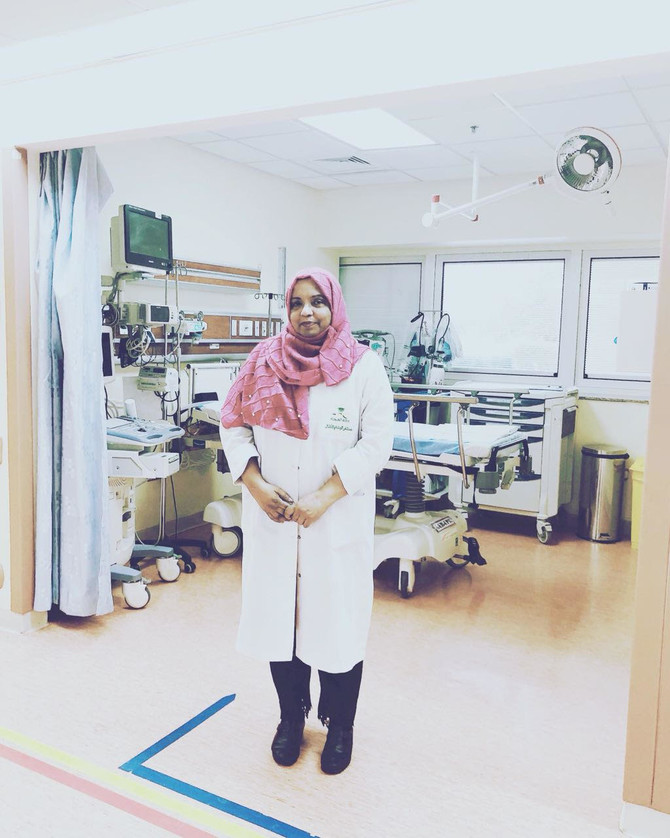MAKKAH: A large number of Hajj pilgrims who streamed in and out of Makkah earlier this week were women in various stages of pregnancy.
Keeping an eye on their progress was a Makkah-based gynecologist who advised them to take the utmost care with their medicine and avoid physical exertion.
Dr. Nighat Irfana, a senior gynecologist who has been assisting Hajj pilgrims for more than eight years, gave her patients advice on the dos and don’ts of performing the annual pilgrimage.
“As physical exertion is part of Hajj pilgrimage, I always advise women to take medicine regularly,” Dr. Irfana told Arab News.
“They must keep their antenatal checkup record. In case of diabetes and high blood pressure, they should carry their doctor’s prescription and take medicine properly,” she said.
“Early pregnancy abortion, preterm labor pain, full-term labor pain, pregnancy associated with diabetes and hypertension are some of the issues that women face during Hajj,” added Dr. Irfana, who is a senior specialist at the Maternity and Children’s Hospital in Makkah.
She advised woman pilgrims to be careful if using medication to postpone menstruation during Hajj. “Such medicines should not be used without consulting the doctor. Knowing the right dose is very important.”
During her eight years of service, Dr. Irfana has also served at Arafat Hospital twice during the Hajj pilgrimage.
“The main responsibilities of doctors during Hajj are to serve Hajj patients with immediate and complete health services and make their Hajj easy and free from pain and disease,” she says.
During her fourth year of Hajj service Dr. Irfana was ferried to Arafat in a helicopter to assist at a birth.
“Due to physical exertion the patient got labor pain before time and was about to deliver. My hospital sent me immediately to ensure a safe and healthy delivery.”
She was also on the scene two years ago when there was a stampede in Makkah.
“All doctors, paramedics and authorities were on alert and equipped to provide medical support to those affected. The whole crisis management was flawless and efficient,” she said.
Surprisingly, despite the large numbers of languages spoken by the pilgrims, she said this does not present the medical staff with a problem.
“As many pilgrims come from Arab countries, language is not an issue. Similarly for Asian pilgrims, there are doctors and paramedics who can communicate with them in their languages. With pilgrims from Western countries, we can speak English. We also have interpreters to deal with patients from countries such as China, Malaysia and Mali,” said Dr. Irfana.
“Saudi Arabia provides best of world-class health services to the Hajj pilgrims. We feel proud that we serve the guests of Allah,” she said.
“For us the best reward for rigorous and long hours at work is the love and blessings that Hajj patients shower on us when we treat them.”
Expert speaks of her experience of supporting pregnant Hajj pilgrims
Expert speaks of her experience of supporting pregnant Hajj pilgrims

AI cannot replace human creativity in literature, expert says

- Dr. Anas Al-Ghamdi: Certain fields will benefit by using AI, but it cannot create great literature
- Al-Ghamdi: When you read a text translated by a machine, you feel the translator’s feelings, not the writer’s
JEDDAH: Artificial intelligence cannot replace the creativity of human beings in literature, according to an expert attending the Jeddah Book Fair 2024.
Dr. Anas Al-Ghamdi, an academic, researcher and author specializing in AI, made the statement in a discussion during a symposium titled: “Artificial Intelligence and the Future of the Book.”
The session was moderated by Mohammed Basalama, an entrepreneur in the cultural sector, who opened the symposium by raising a few questions about the impact of artificial intelligence in the book sector, asking: Will AI be a partner that enhances creativity or a competitor that threatens the human values of literary texts?
He mentioned the main themes of the symposium, which included: the role of AI in improving writing and publishing, its impact on literary creativity and the human value of books, as well as the ethical and legal challenges related to the ownership of produced texts, in addition to using AI as a tool to enhance innovation rather than compete with it.
Al-Ghamdi replied by saying that no doubt AI has become an integral part of life and it can provide a huge amount of information to people in no time, but it cannot create special feelings and the free flow of imagination as human authors do in their writings.
“If we do not use it, others will. Of course, certain fields will benefit by using AI, but it cannot create great literature,” he said.
Al-Ghamdi said that there is a role for AI in enhancing the work of publishing houses by improving marketing, production, and sales.
But, he said, machine translation still suffers from emotional gaps, saying: “When you read a text translated by a machine, you feel the translator’s feelings, not the writer’s.”
The symposium explored how modern technology can reshape the writing and publishing experience, emphasizing the need to use AI as a tool to support human creativity.
It also discussed the ethical and professional challenges related to the ownership of texts produced by AI, while presenting innovative visions for employing this technology to achieve a sustainable future that combines human creativity and technological innovation.
Al-Ghamdi affirmed that AI is not a substitute for human creativity, but a tool that can enrich this creativity if used properly.
European Muslims arrive in Madinah

- The Ministry of Islamic Affairs received the pilgrims, who come from 14 different countries
- The 250-strong group will visit the Prophet’s Mosque and tour historic sites
RIYADH: A new group of Muslim pilgrims arrived in the holy city of Madinah from Europe on Thursday to perform Umrah as part of the Custodian of the Two Holy Mosques Guests Program for Hajj, Umrah and Visit.
The Ministry of Islamic Affairs, Dawah and Guidance, which supervises the program, received the 250 visitors, who come from 14 different countries. The ministry will provide the group services during their stay.
As well as visiting the Prophet’s Mosque and Quba Mosque the pilgrims will tour historic sites including the King Fahd Glorious Qur'an Printing Complex, the Uhud Martyrs’ Cemetery, and the International Fair and Museum of the Prophet’s Biography and Islamic Civilization.
They will then head to the holy city of Makkah to perform Umrah rituals.
Australian deputy PM highlights Saudi Arabia’s strategic importance during visit

DUABI: Australian Deputy Prime Minister and Minister of Defense Richard Donald Marles underlined the importance of Saudi Arabia as a key partner for Australia, highlighting its position as the country’s second-largest trading partner in the Middle East.
In a statement issued by his office on Thursday, Marles said his visit to Saudi Arabia is focused on enhancing cooperation within the G20 framework and other multilateral institutions, as well as reaffirming Australia’s commitment to a rules-based global order.
Marles described Saudi Arabia as a pivotal partner in addressing shared global challenges, emphasizing the significance of deepening economic and diplomatic ties. He added that the visit offers an opportunity to explore new avenues for collaboration and strengthen the relationship between the two countries.
KSrelief’s humanitarian works benefit individuals from Yemen, Ukraine and Sudan

RIYADH: The King Salman Humanitarian Aid and Relief Center’s (KSrelief) humanitarian projects in Yemen, Ukraine and Sudan continue to benefit individuals needing medical and therapeutic intervention.
In Yemen, KSrelief provided services through the Prosthetic and Rehabilitation Center in Aden to 562 patients in November as part of efforts to strengthen the country’s healthcare sector and help individuals who require prostheses.
The center also delivered 1,395 services, including the manufacturing, fitting, and rehabilitation of prosthetic limbs, along with physical therapy and specialized consultations.
Also in Aden, a team of medical volunteers undertook an adult urology surgery campaign from Dec. 15 to 22, with the nine specialists performing 15 procedures on patients. The project was implemented in collaboration with the Saudi Development and Reconstruction Program for Yemen
In Rzeszow, Poland, KSrelief volunteers fitted prosthetic limbs for 32 Ukrainian refugees between Dec. 8 to 15.
In Sudan’s Port Sudan, volunteers from KSrelief ran a pediatric surgical program and has successfully examined 15 children and performed seven successful surgeries so far.
‘Common Ground’ festival celebrates Saudi Arabia and Iraq cultures

- Art, music and folklore to feature at Riyadh event until Dec. 31
- Over 100 works from Iraqi and Saudi artists will be on display
RIYADH: The Kingdom launched the second “Common Ground” festival on Wednesday to celebrate the rich cultures of Saudi Arabia and Iraq.
Organized by the Culture Ministry, “Common Ground” features a variety of activities including art, music and folklore.
The ministry invited residents to “explore and celebrate Iraqi culture and the historical and cultural bonds between the Kingdom of Saudi Arabia and the Republic of Iraq through art, music, storytelling and more.”
The festival, which runs until Dec. 31, is being held at Mega Studio in Riyadh’s Boulevard City.
The event includes a tribute to writer Kareem Al-Iraqi, who died last year, for his contribution to art and literature, which includes novels, plays, songs and screenplays.
The opening night featured songs by renowned Iraqi singer-songwriter Kadim Al-Sahir. And Thursday will have several seminars led by heritage experts.
There will also be over 100 works from Iraqi and Saudi artists on display at the festival.
Meanwhile, in AlUla on Wednesday, Iraq’s Prime Minister Shia Al-Sudani was welcomed by Crown Prince Mohammed bin Salman for discussions on regional events.






















